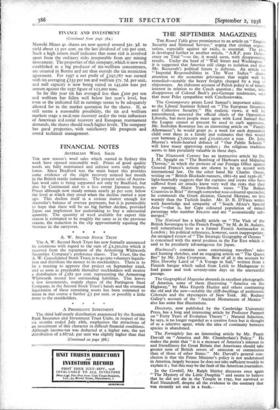THE SEPTEMBER MAGAZINES
THE Round Table gives prominence to an article on " Empire Security and National Service," urging that civilian organi- sation, especially against air raids, is essential. The plea is developed further in another article, " A.R.P. puts Demo- cracy on Trial "—so far, it would seem, with disappointing results. Under the head of " Wall Street and Washington " it is suggested that America still clings to isolation and that Mr. Roosevelt's political future is dubious. An article on " Imperial Responsibilities in The West Indies " draws attention to the economic grievances that might well be remedied—notably the heavy freights charged by a ring of shipowners. An elaborate account of Polish policy is of timely interest in relation to the Czech question ; the writer, who disapproves of Colonel Beck's pro-German tendencies, says that most Poles sympathise with Czechoslovakia.
The Contemporary prints Lord Samuel's important address to the Liberal Summer School on " The European Situation and Collective Security." His realistic views, it will be remembered, annoyed the official chiefs of the Opposition Liberals, but most people must agree with Lord Samuel that the League cannot at present be used to curb aggressors. Mr. Seebohm Rowntree has an interesting article on " Family Allowances"; he would grant 5s. a week for each dependent child over three in a family and estimates that 'this would cost between £7,000,000 and £to,000,000 a year. Dr. John Murray's whole-hearted defence of " Our Public Schools " will have many approving readers ; the religious tradition seems to him peculiarly valuable in these days.
The Nineteenth Century has an instructive article by Dr. J. M. Spaight on " The Bombing of Harbours and Shipping Therein," in which the protests of our Foreign Office against General Franco's actions are shown to be in accord with international law. On the other hand Sir Charles Oman, writing on "British Blockade-runners, 1861-65 and 1936-38," light-heartedly suggests that the captains and crews who have suffered from air attacks know very well the risks that they are running. Major Yeats-Brown views " The Balkan Countries in Brief " through somewhat rose-coloured spectacles; he commends the Greek dictator, General Metaxas, no less warmly than the Turkish leader. Mr. D. R. D'Ewes writes with knowledge and sympathy of " South Africa's Special Area "—that is, her Cape coloured population of mixed parentage who number 800,000 and are " economically sub- merged."
The National has a kindly article on " The Visit of the British Sovereigns to the French People," by M. de St. Aulaire, well remembered here as a former French Ambassador in London; his political references, however, seem inappropriate. An unsigned review of " The Strategic Geography of Oceans " is concerned with the naval position in the Far East which is said to be peculiarly advantageous for Japan.
Blackwood's contains some entertaining travellers' tales and hunting sketches, and an engaging article on " The Queen Bee" by Mr. John Crompton. Best of all is the account by Miss Dorothy Laird of " A Voyage in Sail," written from a Finnish barque which sailed from Leith to Madagascar to load guano and took seventy-nine days on the uneventful passage.
The Geographical Magazine abounds in excellent photographs of America, some of them illustrating " America on the Highway," by Miss Elspeth Huxley and others contrasting the old and the new—notably the cliff-dwellings of prehistoric Colorado and the skyscrapers of New York. Mr. Rodney Gallop's account of the " Ancient Monuments of Mexico " also has some fine illustrations.
Discovery, now published by the Cambridge University Press, has a long and interesting article by Professor Punnett on " Forty Years of Evolution Theory " ; Natural Selection, he says, is no longer regarded as a creative force but is thought of as a selective agent, while the idea of continuity between species is abandoned.
The Fortnightly has an interesting article by Mr. Frank Darvall on " America and Mr. Chamberlain's Policy." He makes the point that " it is a measure of America's interest in and friendliness for Great Britain that Americans should take greater note of British errors of omission or commission than of those of other States." Mr. Darvall's general con- clusion is that the Prime Minister's policy is not understood in America, largely because he does not take sufficient trouble to explain it ; but this may be the fault of the American journalists.
In the Cornhill, Mr. Ralph Shirley discusses once again " The Mystery of the Little Dauphin " and seems to believe that he did not die in the Temple in 1795, but survived as Karl Naundorff, despite all the evidence to the contrary that was recently set out in a book. --






































 Previous page
Previous page